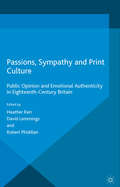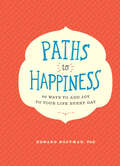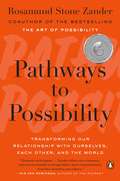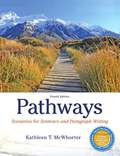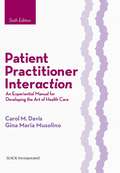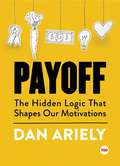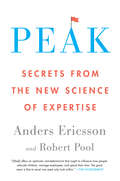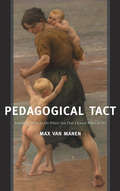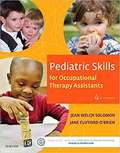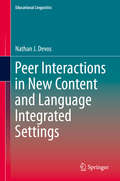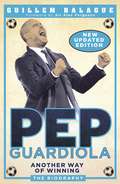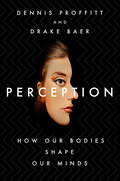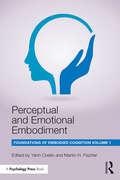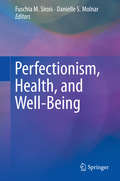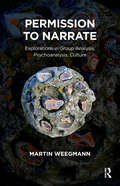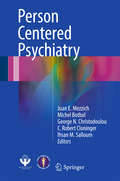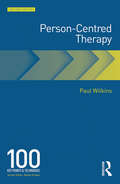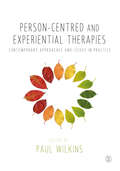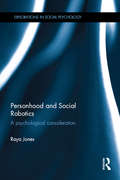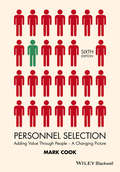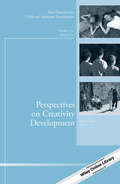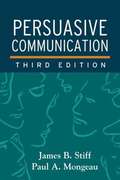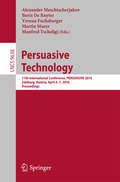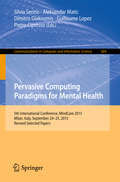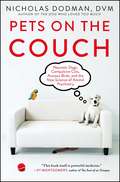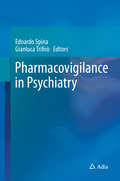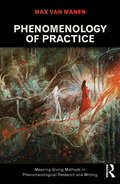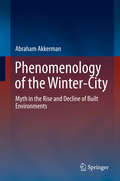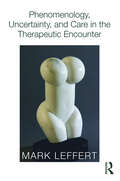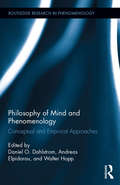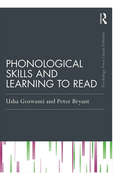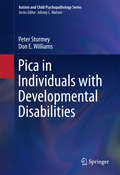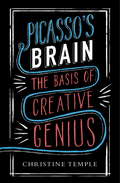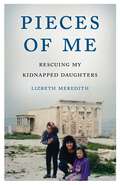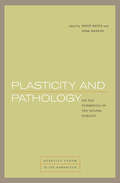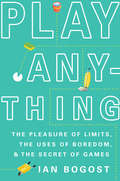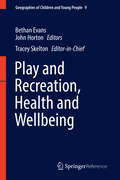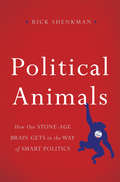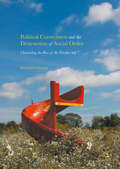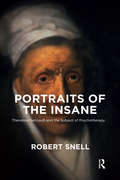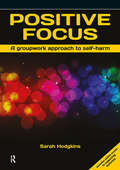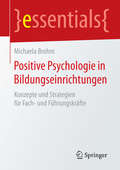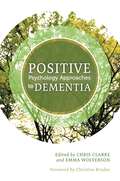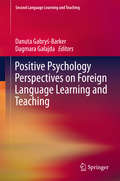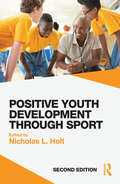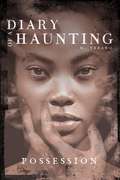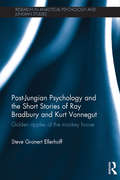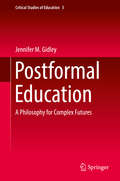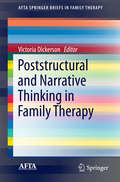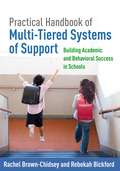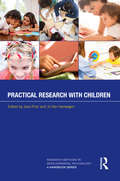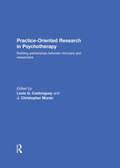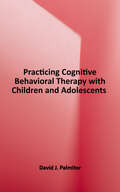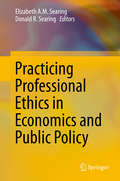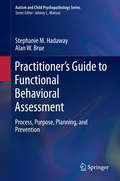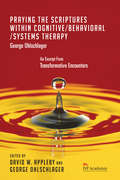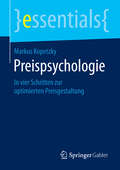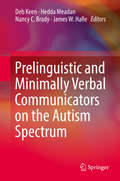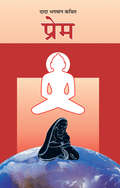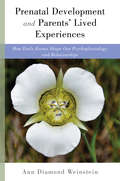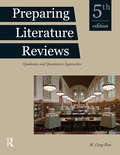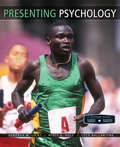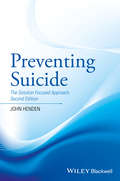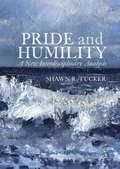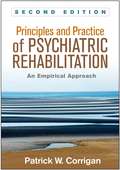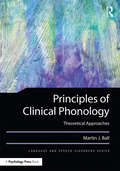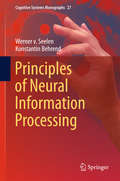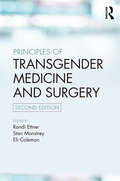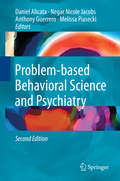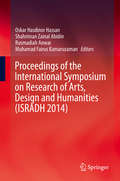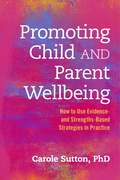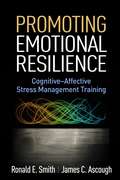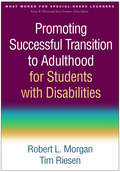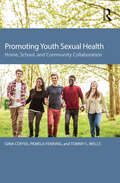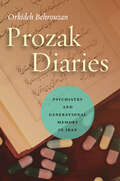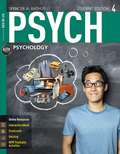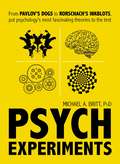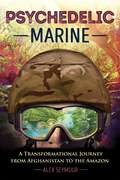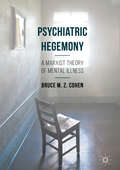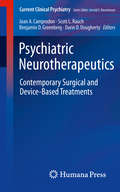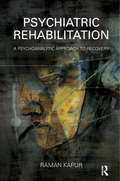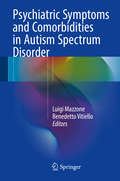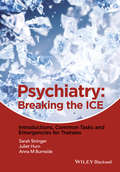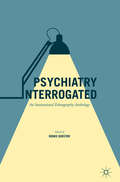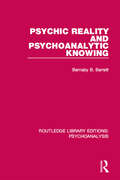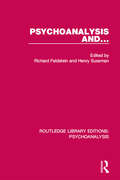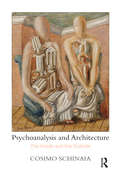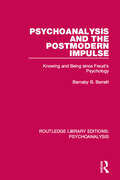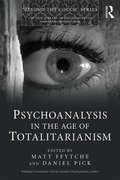- Table View
- List View
Passions, Sympathy and Print Culture: Public Opinion and Emotional Authenticity in Eighteenth-Century Britain (Palgrave Studies in the History of Emotions)
by David Lemmings Heather Kerr Robert PhiddianThis book explores ways in which passions came to be conceived, performed and authenticated in the eighteenth-century marketplace of print. It considers satire and sympathy in various environments, ranging from popular novels and journalism, through philosophical studies of the Scottish Enlightenment, to last words, aesthetics, and plastic surgery.
Paths to Happiness: 50 Ways to Add Joy to Your Life Every Day
by Edward HoffmanA psychologist offers fifty science-backed ideas, activities, and adventures for cultivating a happier mindset.From positive psychology expert Edward Hoffman, Ph.D., Paths to Happiness guides you through fifty fun, stimulating, mind-opening ways to achieve greater joy and feel more fulfilled. From dabbling in watercolors to expressing gratitude, embracing nostalgia to power napping, each suggestion in this book has been shown by scientific research to increase happiness and support well-being.Every topic is explored in a digestible manner and invites readers to reflect on their lives, with easy ways to cultivate a happier mindset. The easy dip-in, dip-out style and engaging activities make this accessible guide to finding happiness in daily living—one that can be revisited again and again.
Pathways to Possibility: Transforming Our Relationship with Ourselves, Each Other, and the World
by Rosamund Stone Zander"Rosamund Zander is a miracle. Her generous voice will resonate with you, change you and help you create work that matters." --Seth Godin, author of The Icarus Deception"Fresh, compelling, and uplifting." --Booklist The bestselling author of The Art of Possibility returns with a new vision for achieving true human fulfillmentIn this powerful and inspiring book, family systems therapist and executive coach Rosamund Stone Zander invites readers to shed the childhood stories that hold us back, and enter a realm of true maturity and fulfillment, where limitless growth becomes possible. As children, we develop stories about how the world works, most of which get improved upon and amended over time. But some do not, even as we mature in other ways. Opinionated, self-centered and fear-driven, these "child stories" are the source of the behavioral and emotional patterns that hold us back. When we learn to identify and rewrite these stories, we can do remarkable, even magical things. Zander shows us that life is a story we tell ourselves, and that we have the power to change that story. She illuminates how breaking old patterns and telling a new story can transform not just our own lives, but also our relationships with others--whether in a marriage, a classroom, or a business. Finally, she demonstrates how, with this new understanding of ourselves and our place within an interconnected world, we can take powerful action in the collective interest, and gain a sense of deep connection to the universe. This galvanizing book expands our notions of how much we can grow and change, whether we can affect others or the world at large, and how much freedom and joy we can experience. Stimulating and profound, it is the perfect companion to her beloved first book, The Art of Possibility.From the Hardcover edition.
Pathways: Scenarios For Sentence And Paragraph Writing
by Kathleen T. McWhorterA lively, integrated approach that emphasizes the connection of the reading and writing processes Pathways: Scenarios for Paragraph and Sentence Writing, Fourth Edition teaches fundamental sentence and paragraph writing skills by engaging student interest, maintaining a focus on expressing ideas rather than on following rules. Students learn grammar in the context of the “whole paper.” Seven of the 17 chapters deal with grammar topics; in these chapters, students examine student essays, read and respond to ideas, and write and revise paragraphs. In Parts II through IV, students apply what they have learned about sentence-level correctness to their own writing as they explore logical paragraph development and organization of ideas. The last two chapters introduce essay writing, enabling students to accelerate from paragraphs to essays, with the goal of achieving stronger, more fully developed writing skills.
Patient Practitioner Interaction: An Experiential Manual For Developing The Art Of Health Care
by Carol M. Davis Gina Maria MusolinoFor over 20 years, Patient Practitioner Interaction: An Experiential Manual for Developing the Art of Health Care has been the cornerstone textbook for health care professionals to learn and develop effective interpersonal professional behavior. Building on the foundational knowledge of past editions, the updated Sixth Edition continues to teach health care professionals how to develop self-awareness and communication skills critical to providing ethical, compassionate, and professional treatment and care for and with their patients. Drs. Carol M. Davis and Gina Maria Musolino designed the textbook to assist both faculty and students through instructional and learning objectives emphasizing the importance of self-awareness in patient interaction. The Sixth Edition guides faculty in teaching the essential component required of all health care professionals: the ability to know oneself and one's patterns of response in highly contentious situations. Through the featured learning activities and chapters on self-awareness and self-assessment, students will be able to better understand, change, and evaluate their learned patterns, values, and readiness for mature patient interactions for both typical and challenging patient care situations. The learned skills of self-awareness and effective interpersonal communication allow clinicians, faculty, and students to provide compassionate and therapeutic treatment and care for the good of the patients and their families. Developing health care providers are also guided in new focus areas in health care leadership and advocacy through interactive exercises. Features and benefits of the Sixth Edition: Four chapters on self-awareness to guide students in evaluating their values and readiness for mature interaction with patients under stressful situations, as well as their ability and capability for self-assessment and peer-assessment Interactive and online learning activities of real-life clinical situations and vignettes with tools provided to use in the classroom to make learning active and engaging. New content areas addressing leadership and advocacy with professional and community organizations; and self and peer assessment for fostering reflective professional development. An accompanying Instructor's Manual to help faculty learn how to convey the material in effective ways Instructors in educational settings can visit www. efacultylounge. com for additional material to be used for teaching in the classroom. Patient Practitioner Interaction: An Experiential Manual for Developing the Art of Health Care, Sixth Edition will continue to be the go-to resource for students, faculty, and clinicians in allied health professions for effective patient interaction.
Payoff: The Hidden Logic That Shapes Our Motivations (TED Books)
by Dan ArielyBestselling author Dan Ariely reveals fascinating new insights into motivation—showing that the subject is far more complex than we ever imagined.Every day we work hard to motivate ourselves, the people we live with, the people who work for and do business with us. In this way, much of what we do can be defined as being “motivators.” From the boardroom to the living room, our role as motivators is complex, and the more we try to motivate partners and children, friends and coworkers, the clearer it becomes that the story of motivation is far more intricate and fascinating than we’ve assumed. Payoff investigates the true nature of motivation, our partial blindness to the way it works, and how we can bridge this gap. With studies that range from Intel to a kindergarten classroom, Ariely digs deep to find the root of motivation—how it works and how we can use this knowledge to approach important choices in our own lives. Along the way, he explores intriguing questions such as: Can giving employees bonuses harm productivity? Why is trust so crucial for successful motivation? What are our misconceptions about how to value our work? How does your sense of your mortality impact your motivation?
Peak: Secrets from the New Science of Expertise
by Robert Pool Anders EricssonFrom the world's reigning expert on expertise comes a powerful new approach to mastering almost any skill. Have you ever wanted to learn a language or pick up an instrument, only to become too daunted by the task at hand? Expert performance guru Anders Ericsson has made a career studying chess champions, violin virtuosos, star athletes, and memory mavens. Peak condenses three decades of original research to introduce an incredibly powerful approach to learning that is fundamentally different from the way people traditionally think about acquiring a skill. Ericsson's findings have been lauded and debated, but never properly explained. So the idea of expertise still intimidates us -- we believe we need innate talent to excel, or think excelling seems prohibitively difficult. Peak belies both of these notions, proving that almost all of us have the seeds of excellence within us -- it's just a question of nurturing them by reducing expertise to a discrete series of attainable practices. Peak offers invaluable, often counterintuitive, advice on setting goals, getting feedback, identifying patterns, and motivating yourself. Whether you want to stand out at work, or help your kid achieve academic goals, Ericsson's revolutionary methods will show you how to master nearly anything.
Pedagogical Tact: Knowing What to Do When You Don’t Know What to Do (Phenomenology of Practice #1)
by Max Van ManenPedagogical Tact describes how teacher-student relations possess an improvisational and ethical character. The daily realities of educators, parents, and childcare specialists are pedagogically conditioned by sensitive insights, active thoughtfulness, and the creative ability to act caringly and appropriately in the immediacy of the moment. Internationally known educator Max van Manen shows through recognizable examples and evocative stories how good teaching is driven by the phenomenology of pedagogy. His book-refocuses educators and others away from an emphasis on instrumental skills and technocratic programs toward the need for pedagogical tact;-describes how pedagogical actions have latent effects that will influence children throughout their lives;-shows how our actions with young people have pedagogically ethical and moral significance;-gives educators back their original vocational motivation and inspiration.
Pediatric Skills for Occupational Therapy Assistants
by Jane Clifford O'Brien Jean W. SolomonLearn to provide effective therapy for children and adolescents with Pediatric Skills for Occupational Therapy Assistants, 4th Edition. This market-leading text offers a comprehensive, application-focused guide to pediatric occupational therapy assisting by incorporating the AOTA Practice Framework. The text’s focused and easy-to-use approach to pediatrics covers everything from the scope of practice to in-depth coverage of normal development, pediatric health conditions, and treatment planning. This new edition has also been thoroughly updated and expanded to include new content and chapters on community systems, physical agent modalities, the Model of Human Occupation assessments, childhood obesity, documentation, neurodevelopmental treatment, and concepts of elongation.
Peer Interactions in New Content and Language Integrated Settings
by Nathan J. DevosTrade schools, universities, and programs for international students have begun to experiment with Content and Language Integrated Learning (CLIL) as a viable pedagogy for instruction, as the pedagogy of CLIL increasingly gains recognition as a practical form of language and content education in Europe and beyond, and its application in instructional settings becomes more diverse. Corresponding with CLIL's growth, this book focuses on foreign language use during peer interactions in a new CLIL setting. It particularly concentrates on how to conduct research when the focus is on learner interactions. The theoretical background, research methods, and research instruments are explained in a brief and understandable manner. This book is intended for those interested in CLIL and peer interactions and includes a framework and ideas for investigating new CLIL contexts in a practical manner allowing undergraduate and graduate students to conduct their own research in these settings.
Pep Guardiola: Another Way of Winning: The Biography
by Guillem Balague'A must-read for anyone who's doubted Pep's influence, from handing the power to Barça's homegrown crop to never betraying his childhood romanticism of the game Four Four Two'Balague's insightful biography presents Guardiola as a relentless perfectionist - a man obsessed with the minutiae of football, often unable to switch off' SPORTThis fully updated edition of the international bestseller includes Manchester City's incredible 2017-18 league triumphPep Guardiola is the most successful and sought-after football coach in the world. After being appointed first-team manager in 2008, he transformed Barcelona into arguably the greatest club side of all time, winning thirteen trophies in four years, and he won the Double twice in his three years in charge of Bayern Munich. He then faced his biggest challenge yet when he joined Manchester City in 2016: to turn them into a team that consistently wins in the most difficult of leagues and a regular challenger in the Champions League. But in only his second year at the club, he had turned a good side into memorable one, leading them to the Premier League title in record-breaking style . . . and doing it the Guardiola way.Guillem Balagué has followed Pep's career from the outset and has had direct access to the man and his inner circle for this updated edition. This then is the definitive portrait of Pep Guardiola and his relentless pursuit of footballing perfection.
Perception: How Our Bodies Shape Our Minds
by Dennis Proffitt Drake BaerA groundbreaking popular psychology book that explores the deep connection between our body and our brain.Over decades of study, University of Virginia psychologist Dennis Proffitt has shown that we are each living our own personal version of Gulliver’s Travels, where the size and shape of the things we see are scaled to the size of our bodies, and our ability to interact with them. Stairs look less steep as dieters lose weight, baseballs grow bigger the better players hit, hills look less daunting if you’re standing next to a close friend, and learning happens faster when you can talk with your hands.Written with journalist Drake Baer, Perception marries academic rigor with mainstream accessibility. The research presented and the personalities profiled will show what it means to not only have, but be, your unique human body. The positive ramifications of viewing ourselves from this embodied perspective include greater athletic, academic, and professional achievement, more nourishing relationships, and greater personal well-being. The better we can understand what our bodies are—what they excel at, what they need, what they must avoid—the better we can live our lives.
Perceptual and Emotional Embodiment: Foundations of Embodied Cognition Volume 1
by Martin H. Fischer Yann CoelloThis two-volume set provides a comprehensive overview of the multidisciplinary field of Embodied Cognition. With contributions from internationally acknowledged researchers from a variety of fields, Foundations of Embodied Cognition reveals how intelligent behaviour emerges from the interplay between brain, body and environment. Covering early research and emerging trends in embodied cognition, Volume 1 Perceptual and Emotional Embodiment is divided into four distinct parts, bringing together a number of influential perspectives and new ideas. Part one opens the volume with an overview of theoretical perspectives and the neural basis of embodiment, before part two considers body representation and its links with action. Part three examines how actions constrain perception of the environment, and part four explores how emotions can be shaped and structured by the body and its activity. Building on the idea that knowledge acquisition, retention and retrieval are intimately interconnected with sensory and motor processes, Foundations of Embodied Cognition is a landmark publication in the field. It will be of great interest to researchers and advanced students from across the cognitive sciences, including those specialising in psychology, neuroscience, intelligent systems and robotics, philosophy, linguistics and anthropology.
Perfectionism, Health, and Well-Being
by Fuschia M. Sirois Danielle S. MolnarThis book brings together the world's leading perfectionism researchers and theorists to present their latest findings and ideas on how and why perfectionism may confer risks or benefits for health and well-being, as well as the contexts which may shape these relationships. In addition to providing an overview of the latest research in this field, this volume explores new conceptual models that may help further our understanding of when, how, and why perfectionism may be implicated in health and well-being. After presenting an overview of the conceptual and measurement issues surrounding the concepts of perfectionism, health, and well-being, three sections address the implications of perfectionism for health and well-being. The first of these sections provides an overview of research and theory on the role of perfectionism in health and illness, health behaviors, and chronic illness. The next section of the book focuses on the cognitive and affective underpinnings of perfectionism as they relate to psychopathology, distress, and well-being, including how it applies to eating disorders, depression, and anxiety. The final section of the book explores specific contexts and how they may contour the associations of perfectionism with health and well-being, such as in the domains of interpersonal relationships, academic pursuits, and work-related settings. Perfectionism and wellbeing is a topic not just for researchers and scholars, but clinicians and practitioners as well. For this reason, chapters also include a discussion of prevention and treatment issues surrounding perfectionism where relevant. By doing so, this volume is an important resource for not only researchers, but also for those who may wish to use it in applied and clinical settings. By presenting the latest theory and research on perfectionism, health, and well-being with a translational focus, Perfectionism, Health, and Well-Being makes a unique and significant contribution to perfectionism as well as general wellness literature, and highlights the need to address the burden of perfectionism for health and well-being. .
Permission to Narrate: Explorations in Group Analysis, Psychoanalysis, Culture
by Martin WeegmannPermission to Narrate develops exciting new theory and explorations for group analysis. They are diverse in range and, from differing bases in theory and research, aim to cast light on how clients find voice and speak out in groups and the importance of rhetoric in the understanding of communication. It addresses the ways in which silenced, submerged and less confident voices emerge, finding permission and narration, often against the odds. Positioning and dialogical theory is used to show how such voices are caught up in and defined by discourses, and also how we can transcend the definitions and positions into which we are thrown. Accessible clinical and historical examples bring theory to life. Permission to Narrate also uses applied group analytic theory to consider the cultural role and rhetoric of monsters, and what these representations tell us about the position in which human beings conceive themselves. Also explored, using applied group theory, are the meetings of Alcoholics Anonymous and Quakers, both serving as remarkable examples of different, alternative group formations.
Person Centered Psychiatry
by C. Robert Cloninger Juan E. Mezzich Michel Botbol George N. Christodoulou Ihsan M. SalloumThis book presents an authoritative overview of the emerging field of person-centered psychiatry. This perspective, articulating science and humanism, arose within the World Psychiatric Association and aims to shift the focus of psychiatry from organ and disease to the whole person within their individual context. It is part of a broader person-centered perspective in medicine that is being advanced by the International College of Person-Centered Medicine through the annual Geneva Conferences held since 2008 in collaboration with the World Medical Association, the World Health Organization, the International Council of Nurses, the International Federation of Social Workers, and the International Alliance of Patients' Organizations, among 30 other international health institutions. In this book, experts in the field cover all aspects of person-centered psychiatry, the conceptual keystones of which include ethical commitment; a holistic approach; a relationship focus; cultural sensitivity; individualized care; establishment of common ground among clinicians, patients, and families for joint diagnostic understanding and shared clinical decision-making; people-centered organization of services; and person-centered health education and research.
Person-Centred Therapy: 100 Key Points (100 Key Points)
by Paul WilkinsPerson-centred therapy, rooted in the experience and ideas of the eminent psychotherapist Carl Rogers, is widely practised in the UK and throughout the world. It has applications in health and social care, the voluntary sector and is relevant to work with people who are severely mentally and emotionally distressed. As well as being a valuable sourcebook and offering a comprehensive overview, this edition includes updated references and a new section on recent developments and advances. The book begins with a consideration of the principles and philosophy underpinning person-centred therapy before moving to a comprehensive discussion of the classical theory upon which practice is based. Further areas of discussion include: The model of the person, including the origins of mental and emotional distress The process of constructive change A review of revisions of and additions to person-centred theory Child development, styles of processing and configurations of self The quality of presence and working at relational depth Criticisms of the approach are addressed and rebutted and the application of theory to practice is discussed. The new final section is concerned with advances and developments in theory and practice including: Counselling for Depression The Social Dimension to Person-Centred Therapy Person-Centred Practice with People experiencing Severe and Enduring Distress and at the ‘Difficult Edge’ A Review of Research Throughout the book, attention is drawn to the wider person-centred literature to which it is a valuable key. Person-Centred Therapy will be of particular use to students, scholars and practitioners of person-centred therapy as well as to anyone who wants to know more about one of the major psychotherapeutic modalities.
Person-centred and Experiential Therapies: Contemporary Approaches and Issues in Practice
by Paul WilkinsAn essential new guide for any person-centred trainee or practitioner, this book explores some of the key contemporary counselling and psychotherapy approaches that have developed from classical client-centred therapy. Part One discusses five approaches including Classic Client-Centred Therapy; Relational and Dialogical Person-Centred Therapy; Focusing-Oriented Therapy; Experiential Therapy; Emotion Focussed Therapy and Person-Centred Expressive therapy. Each approach is introduced, considered in terms of its history, development, current context and relevant research, as well as exemplified through a range of inspiring vignettes. Part Two brings readers up-to-date with recent developments in the application of person-centred practice, including creative approaches, transcultural counselling, work with people who’ve experienced trauma as well as those who are experiencing limitations to their ability. Written by leading UK-based and international authors, this authoritative and thought-provoking book is a must read for anyone keen to understand the many approaches of person-centred therapy.
Person-centred and Experiential Therapies: Contemporary Approaches and Issues in Practice
by Paul WilkinsAn essential new guide for any person-centred trainee or practitioner, this book explores some of the key contemporary counselling and psychotherapy approaches that have developed from classical client-centred therapy. Part One discusses five approaches including Classic Client-Centred Therapy; Relational and Dialogical Person-Centred Therapy; Focusing-Oriented Therapy; Experiential Therapy; Emotion Focussed Therapy and Person-Centred Expressive therapy. Each approach is introduced, considered in terms of its history, development, current context and relevant research, as well as exemplified through a range of inspiring vignettes. Part Two brings readers up-to-date with recent developments in the application of person-centred practice, including creative approaches, transcultural counselling, work with people who’ve experienced trauma as well as those who are experiencing limitations to their ability. Written by leading UK-based and international authors, this authoritative and thought-provoking book is a must read for anyone keen to understand the many approaches of person-centred therapy.
Personhood and Social Robotics: A psychological consideration (Explorations in Social Psychology)
by Raya A JonesAn exponentially growing industry, human robot interaction (HRI) research has drawn predominantly upon psychologists’ descriptions of mechanisms of face-to-face dyadic interactions. This book considers how social robotics is beginning unwittingly to confront an impasse that has been a perennial dilemma for psychology, associated with the historical ‘science vs. art’ debate. Raya Jones examines these paradigmatic tensions, and, in tandem, considers ways in which the technology-centred discourse both reflects and impacts upon understanding our relational nature. Chapters in the book explore not only how the technology-centred discourse constructs machines as us, but also how humans feature in this discourse. Focusing on how the social interaction is conceptualised when the human-robot interaction is discussed, this book addresses issues such as the long-term impact on persons and society, authenticity of relationships, and challenges to notions of personhood. By leaving aside terminological issues, Jones attempts to transcend ritual of pitching theories against each other in order to comprehensively analyse terms such as subjectivity, self and personhood and their fluid interplay in the world that we inhabit. Personhood and Social Robotics will be a key text for postgraduate students, researchers and scholars interested in the connection between technology and human psychology, including psychologists, science and technology studies scholars, media studies scholars and humanists. The book will also be of interest to roboticists and HRI researchers, as well as those studying or working in areas of artificial intelligence and interactive technologies more generally.
Personnel Selection
by Mark CookThis is a fully updated edition of Personnel Selection, a seminal text on the psychometric approach to personnel selection by a noted expert in the field. Focuses on cutting-edge topics including the influence of social networking sites, adverse impact, age differences and stereotypes, distribution of work performance, and the problems of selecting new employees using research based on incumbent employees Questions established beliefs in the field, especially issues that have been characterized as "not a problem," such as differential validity, over-reliance on self-report, and "faking good" Contains expanded discussion of research and practice in the US and internationally, while maintaining the definitive coverage of UK and European selection approaches Provides comprehensive yet accessible information for professionals and students, as well as helpful pedagogical tools (technical and statistical boxes, simplified figures and tables, research agenda boxes, key point summaries, and key references)
Perspectives on Creativity Development: New Directions for Child and Adolescent Development, Number 151
by Cad Baptiste BarbotCreativity development is a nonlinear and multifaceted process starting early in life. This new thematic issue incorporates recent insights into the intersection of creativity research and developmental science. Specifically, it addresses the development of creativity with a focus on childhood and adolescence with a multidisciplinary perspective, including developmental, neurobiological, intercultural, educational, psychosocial, and differential approaches. Topics covered include: The foundation of adult creativity in childhood and adolescence, Developmental perspectives on the issue of domain generality-specificity of creativity, The neurobiological basis of creativity in childhood and adolescence. Commentaries by established proponents of the field integrate meaningfully these multiple insights on creativity development, as a reference for developmental scientists, creativity researchers, and practitioners. This is the 151st volume in this Jossey-Bass series New Directions for Child and Adolescent Development. Its mission is to provide scientific and scholarly presentations on cutting edge issues and concepts in this subject area. Each volume focuses on a specific new direction or research topic and is edited by experts from that field.
Persuasive Communication, Third Edition
by Paul A. Mongeau James B. StiffProviding an accessible integration of theory and research methods, this text prepares students to critically analyze persuasive appeals and to design effective messages and campaigns. The book draws on key ideas from both communication and social psychology to explore the mutual influence of cognitive and affective processes and the characteristics and production of messages. It gives the reader a solid grasp of foundational issues in persuasion research, the core components of persuasive transactions, and major theoretical models. Instructive concrete examples illustrate applications of the concepts in such settings as health promotion, political campaigns, the courtroom, and advertising. New to This Edition *Engaging topic boxes on college drinking, attitudes about same-sex marriage, the "birther" movement, and other timely issues. *New or expanded discussions of the integrative model of behavioral prediction, the use of guilt appeals, social media, individualized tailoring of political messages, and numerous other topics. *The latest data and theoretical perspectives. *Epilogue on current and future trends in the field.
Persuasive Technology
by Alexander Meschtscherjakov Boris De Ruyter Verena Fuchsberger Martin Murer Manfred TscheligiThis book constitutes therefereed proceedings of the 11th International Conference on PersuasiveTechnology, PERSUASIVE 2016, held in Salzburg, Austria, in April 2016. The 27 revised full papers and 3 revised short papers presented were carefullyreviewed and selected from 73 submissions. The papers are grouped in topicalsections on individual differences, theoretical reflections, prevention andmotivation, methods and models, games and gamification, interventions forbehavior change, and design strategies and techniques.
Pervasive Computing Paradigms for Mental Health
by Silvia Serino Aleksandar Matic Dimitris Giakoumis Guillaume Lopez Pietro CipressoThis book constitutes the refereed proceedings of the 5th International Conference on Pervasive Computing Paradigms for Mental Health, MindCare 2015, held in Milan, Italy, in September 2015. The 23 full papers and 6 short papers presented were carefully reviewed and selected from 40 submissions. The papers deal with the use of technologies in favor of maintaining and improving mental wellbeing. They focus on building new computing paradigms and on addressing a multitude of challenges in mental healthcare, for example in psychiatric and psychological domains with emphasis on new technologies, such as video and audio technologies and mobile and wearable computing.
Pets on the Couch: Neurotic Dogs, Compulsive Cats, Anxious Birds, and the New Science of Animal Psychiatry
by Nicholas DodmanThe pioneering veterinarian and author of the New York Times bestseller, The Dog Who Loved Too Much, and the national bestseller, The Cat Who Cried for Help, recounts his uniquely entertaining--and poignant--stories of treating animals for all-too-human problems as he reveals his amazing breakthroughs with the new science of One Medicine.The Oliver Sacks of animal brains, Dr. Nicholas Dodman is an internationally renowned veterinarian and research scientist who wrote one of the first popular books to recognize the complex emotional lives of dogs and to reveal innovative ways to help them, including with Puppy Prozac. Now, Dr. Dodman once again breaks new ground with the practice of One Medicine, the profound recognition that humans and other animals share the same neurochemistry, and that our minds and emotions work in similar ways. Racehorses with Tourette's Syndrome, spinning dogs with epilepsy, cats with Obsessive Compulsive Disorder, feather-plucking parrots with anxiety, and a diffident Bull Terrier with autism--these astonishing cases were all helped by One Medicine, which emphasizes the similarities rather than differences between animals and humans. Inspiring, sometimes heartbreaking, and utterly fascinating, Pets on the Couch demonstrates how what we share with our animals can only lead us to a greater appreciation for them--and our mutual bonds.
Pharmacovigilance in Psychiatry
by Edoardo Spina Gianluca TrifiròThe first authoritative textbook specifically addressing issues of the field, this book delivers a focused discussion on several themes in psychiatry while providing a sound background on pharmacovigilance. Internationally-recognised researchers, clinicians and pharmacovigilance experts contributed to this textbook, giving it the benefit of different perspectives and years of experience. Pharmacovigilance in psychiatry provides a thorough introduction to this field but goes on to explore advanced themes such as methodologies and resources used for pharmacovigilance in psychiatry, challenges as well as most recent developments to this field, making it suitable for under-graduates, graduate and post-doctoral students and persons working pharmacovigilance who seek to broaden their knowledge on this subject.
Phenomenology of Practice: Meaning-Giving Methods in Phenomenological Research and Writing (Developing Qualitative Inquiry #13)
by Max Van ManenMax van Manen offers an extensive exploration of phenomenological traditions and methods for the human sciences. It is his first comprehensive statement of phenomenological thought and research in over a decade. Phenomenology of practice refers to the meaning and practice of phenomenology in professional contexts such as psychology, education, and health care, as well as to the practice of phenomenological methods in contexts of everyday living. Van Manen presents a detailed description of key phenomenological ideas as they have evolved over the past century; he then thoughtfully works through the methodological issues of phenomenological reflection, empirical methods, and writing that a phenomenology of practice offers to the researcher. Van Manen's comprehensive work will be of great interest to all concerned with the interrelationship between being and acting in human sciences research and in everyday life. Max van Manen is the editor of the series Phenomenology of Practice, https://www.routledge.com/series/PPVM
Phenomenology of the Winter-City
by Abraham AkkermanThis book explores how the weather and city-form impact the mind, and how city-form and mind interact. It builds on Merleau-Ponty's contention that mind, the human body and the environment are intertwined in a singular composite, and on Walter Benjamin's suggestion that mind and city-form, in mutual interaction, through history, have set the course of civilization. Bringing together the fields of philosophy, urbanism, geography, history, and architecture, the book shows the association of existentialism with prevalence of mood disorder in Northern Europe at the close of Little Ice Age. It explains the implications of city-form and traces the role of the myths and allegories of urban design as well as the history of gender projection onto city-form. It shows how urbanization in Northern Europe provided easier access to shelter, yet resulted in sunlight deprivation, and yielded increasing incidence of depression and other mental disorder among the European middle-class. The book uses the examples of Kierkegaard, Nietzsche, Dostoevsky and Kafka, to show how walking through the streets, squares and other urban voids became the informal remedy to mood disorder, a prominent trait among founders of modern Existentialism. It concludes by describing how the connection of anguish and violence is relevant to winter depression in cities, in North America in particular.
Phenomenology, Uncertainty, and Care in the Therapeutic Encounter
by Mark LeffertPhenomenology, Uncertainty and Care in the Therapeutic Encounter is the latest in a series of books where Mark Leffert explores the therapeutic encounter as both process and situation; looking for evidence of therapeutic effectiveness rather than accepting existing psychoanalytic concepts of theory or cure without question. Mark Leffert focuses on the uncomfortable fact that analysts and therapists can and do make many mistaken assumptions and false moves within their clinical practice, and that there is a tendency to ignore the significant levels of uncertainty in what they do. Beginning with a discussion of the phenomenology of the self and its relations with the world, the book moves on to explore the notion that interdisciplinary discourse both opens up possibilities in the therapeutic encounter but also imposes healthy constraints on what can be thought or theorized about psychoanalytically. Phenomenology, Uncertainty and Care in the Therapeutic Encounter contributes a new understanding of familiar material and brings a new focus to the care-giving and healing aspects of psychoanalysis and psychotherapy leading to a shift in the analyst’s identity from that of one who analyses to one who cares for and heals. This book will be of interest to Psychoanalysts and psychotherapists, neuroscientists and academics in the fields of psychiatry, comparative literature and literature and the mind.
Philosophy of Mind and Phenomenology: Conceptual and Empirical Approaches (Routledge Research in Phenomenology)
by Daniel O. Dahlstrom Walter Hopp Andreas ElpidorouThis volume identifies and develops how philosophy of mind and phenomenology interact in both conceptual and empirically-informed ways. The objective is to demonstrate that phenomenology, as the first-personal study of the contents and structures of our mentality, can provide us with insights into the understanding of the mind and can complement strictly analytical or empirically informed approaches to the study of the mind. Insofar as phenomenology, as the study or science of phenomena, allows the mind to appear, this collection shows how the mind can reappear through a constructive dialogue between different ways—phenomenological, analytical, and empirical—of understanding mentality.
Philosophy of Olfactory Perception
by Andreas KellerThis book reconsiders the majorcurrent topics in the philosophy of perception using olfaction as the paradigmsense. The author reveals how many of the most basic concepts of philosophy ofperception are based on peculiarities of visual perception not found in othermodalities, and addresses how different the philosophy of perception would beif based on olfaction. The book addresses several aspects of olfaction,including perceptual qualities, percepts, olfaction and cognitive processes,and consciousness. The first partof the book considers perception with respect to its ability to guide behaviorsand to make information available to cognitive processes. The author continuesby addressing the differences between conscious and non-conscious olfactoryperception, and presents an argument for an important role of attention inconscious processes. The book concludes by discussing the function of consciousbrain processes and their link to guiding behaviors in complex situations.
Phonological Skills and Learning to Read: Classic Edition (Psychology Press & Routledge Classic Editions)
by Peter Bryant Usha GoswamiIn this classic edition of their ground-breaking work, Usha Goswami and Peter Bryant revisit their influential theory about how phonological skills support the development of literacy. The book describes three causal factors which can account for children’s reading and spelling development: pre-school phonological knowledge of rhyme and alliteration the impact of alphabetic instruction on knowledge about phonemes links between early spelling and later reading. This classic edition includes a new introduction from the authors which evaluates research from the past 25 years. Examining new evidence from auditory neuroscience, statistical modelling and orthographic database analyses, as well as new data from cognitive developmental psychology and educational studies, the authors consider how well their original ideas have stood up to the test of time. Phonological Skills and Learning to Read will continue to be essential reading for students and researchers in language and literacy development, and those involved in teaching children to read.
Physical Exercise Interventions for Mental Health
by Michelle Riba Lam, Linda C. W. and Riba, Michelle Lam, Linda C. W.Exercise is well known to be beneficial to physical health; however, increasing research indicates that physical exercise is also beneficial to brain health and may alleviate symptoms of mental disorders. This book, written by international experts, describes and explores the theory and practice of exercise intervention for different mental disorders across the life span. Drawing on evidence from basic neuroscience research, and enriched with findings from the latest clinical trials, the work provides clear descriptions of current practice and highlights ways to translate this knowledge into pragmatic advice for use in daily practice. The chapters cover a broad range of conditions including neurodevelopmental disorders, depression, anxiety, psychosis and late life neurocognitive disorders. This book is for mental health clinicians including psychiatrists, psychologists, social workers, nurses, as well as internists, paediatricians and geriatricians seeking a comprehensive and individualized approach to treatment.
Pica in Individuals with Developmental Disabilities
by Peter Sturmey Don E. WilliamsThis book provides a comprehensive overview of the clinical phenomenon of pica. It focuses specifically on the disorder as it presents in children, adolescents, and adults with autism spectrum disorder (ASD) and intellectual disabilities (ID). Initial chapters introduce current theories and definitions, followed by a more detailed examination of how developmental disabilities complicate diagnosis and intervention. The volume describes evidence-based and clinically sound approaches to the treatment and prevention of pica in school and adult clinical settings, ranging from behavioral treatment to function-based interventions. In addition, it discusses common diagnostic, client, and provider issues that result in pica remaining undetected among individuals with ASD and ID. Featured topics include: Definition of pica in accessible terms, differentiating between various forms of the disorder. Issues and practical methods of prevention and treatment of pica in developmentally disabled persons. Functional and behavioral assessment methods for pica in individuals with ASD and ID. A range of effective behavioral and nonbehavioral treatments for pica. Illustrative cases and service delivery challenges. Areas for future research and practice. Pica in Individuals with Developmental Disabilities is an invaluable resource for researchers, clinicians and other professionals, and graduate students in clinical child and school psychology, behavior analysis/therapy, and social work as well as child and adolescent psychiatry, pediatrics, family studies, and special education.
Picasso's Brain: The basis of creative genius
by Christine TempleWhere does creativity come from? Why are some people more creative than others?Eminent neuropsychologist Christine Temple navigates a wide range of factors from the hard science (visual memory, spatial ability, brain functions) to the environmental (the 'mad genius' myth, and Gladwell's 10,000 hours of practice) in her study of what contributes to creativity. Using Pablo Picasso as her model of a creative genius, she weighs up each theory as it applies to Picasso and shows how his own creativity came from a combination of many factors.In this book, she looks at Picasso's playful mindset and passionate relationships, investigates the possibility that genius is genetic and can be inherited in families, considers whether creative genii perceive the world in a different way, and determines whether single-mindedness and focus play a part. This is the first book to look at a multitude of traits in creativity, and nail down the key factors that matter (and also which ones don't) to provide an overall picture of this fascinating area, linking the science to the personal.
Picasso's Brain: The basis of creative genius
by Christine TempleWhere does creativity come from? Why are some people more creative than others?Eminent neuropsychologist Christine Temple navigates a wide range of factors from the hard science (visual memory, spatial ability, brain functions) to the environmental (the 'mad genius' myth, and Gladwell's 10,000 hours of practice) in her study of what contributes to creativity. Using Pablo Picasso as her model of a creative genius, she weighs up each theory as it applies to Picasso and shows how his own creativity came from a combination of many factors.In this book, she looks at Picasso's playful mindset and passionate relationships, investigates the possibility that genius is genetic and can be inherited in families, considers whether creative genii perceive the world in a different way, and determines whether single-mindedness and focus play a part. This is the first book to look at a multitude of traits in creativity, and nail down the key factors that matter (and also which ones don't) to provide an overall picture of this fascinating area, linking the science to the personal.
Pieces of Me: Rescuing My Kidnapped Daughters
by Lizbeth MeredithNow a Lifetime television movie starring Sarah Drew, Stolen By Their Father was adapted from the story of Pieces of Me: Rescuing My Kidnapped Daughters about a young mother and her daughters face the unimaginable consequences after leaving abuse. In 1994, Lizbeth Meredith said good-bye to her four- and six year-old daughters for a visit with their non-custodial father only to learn days later that they had been kidnapped and taken to their father's home country of Greece. Twenty-nine and just on the verge of making her dreams of financial independence for her and her daughters come true, Lizbeth now faced a $100,000 problem on a $10 an hour budget. For the next two years fueled by memories of her own childhood kidnapping, Lizbeth traded in her small life for a life more public, traveling to the White House and Greece, and becoming a local media sensation in order to garner interest in her efforts. The generous community of Anchorage becomes Lizbeth's makeshift family?one that is replicated by a growing number of Greeks and expats overseas who help Lizbeth navigate the turbulent path leading back to her daughters.
Plasticity and Pathology: On the Formation of the Neural Subject (Berkeley Forum In The Humanities Ser.)
by David Bates Nima BassiriTwo leading neuroscientists examine the current paradigm of the &“neural subject&” and what we can learn from neurological trauma, pathology, and adaption. With the rise of cognitive science and the revolution in neuroscience, the study of human subjects—thinking, feeling, acting individuals—ultimately focuses on the human brain. In both Europe and the United States, massive state-funded research is focused on mapping the brain in all its remarkable complexity. The metaphors employed are largely technological, using a diagram of synaptic connectivity as a path to understanding human behavior. But alongside this technologized discourse, we find another perspective, one that emphasizes the brain&’s essential plasticity, both in development and as a response to traumas such as strokes, tumors, or gunshot wounds. This collection of essays brings together a diverse range of scholars to investigate how the &“neural subject&” of the twenty-first century came to be. Taking approaches both historical and theoretical, they probe the possibilities and limits of neuroscientific understandings of human experience. Topics include landmark studies in the history of neuroscience, the relationship between neural and technological &“pathologies,&” and analyses of contemporary concepts of plasticity and pathology in cognitive neuroscience. Central to the volume is a critical examination of the relationship between pathology and plasticity. Because pathology is often the occasion for neural reorganization and adaptation, it exists not in opposition to the brain&’s &“normal&” operation but instead as something intimately connected to our ways of being and understanding.
Play Anything: The Pleasure of Limits, the Uses of Boredom, and the Secret of Games
by Ian BogostHow filling life with play-whether soccer or lawn mowing, counting sheep or tossing Angry Birds-forges a new path for creativity and joy in our impatient ageLife is boring: filled with meetings and traffic, errands and emails. Nothing we'd ever call fun. But what if we've gotten fun wrong? In Play Anything, visionary game designer and philosopher Ian Bogost shows how we can overcome our daily anxiety; transforming the boring, ordinary world around us into one of endless, playful possibilities.The key to this playful mindset lies in discovering the secret truth of fun and games. Play Anything, reveals that games appeal to us not because they are fun, but because they set limitations. Soccer wouldn't be soccer if it wasn't composed of two teams of eleven players using only their feet, heads, and torsos to get a ball into a goal; Tetris wouldn't be Tetris without falling pieces in characteristic shapes. Such rules seem needless, arbitrary, and difficult. Yet it is the limitations that make games enjoyable, just like it's the hard things in life that give it meaning.Play is what happens when we accept these limitations, narrow our focus, and, consequently, have fun. Which is also how to live a good life. Manipulating a soccer ball into a goal is no different than treating ordinary circumstances- like grocery shopping, lawn mowing, and making PowerPoints-as sources for meaning and joy. We can "play anything" by filling our days with attention and discipline, devotion and love for the world as it really is, beyond our desires and fears.Ranging from Internet culture to moral philosophy, ancient poetry to modern consumerism, Bogost shows us how today's chaotic world can only be tamed-and enjoyed-when we first impose boundaries on ourselves.
Play and Recreation, Health and Wellbeing
by John Horton Tracey Skelton Bethan EvansGeographies of children and young people is a rapidly emerging sub-discipline within human geography. There is now a critical mass of established academic work, key names within academia, growing numbers of graduate students and expanding numbers of university level taught courses. There are also professional training programmes at national scales and in international contexts that work specifically with children and young people. In addition to a productive journal of Children's Geographies, there's a range of monographs, textbooks and edited collections focusing on children and young people published by all the major academic presses then there is a substantive body of work on younger people within human geography and active authors and researchers working within international contexts to warrant a specific Major Reference Work on children's and young people's geographies. The volumes and sections are structured by themes, which then reflect the broader geographical locations of the research.
Political Animals: How Our Stone-age Brain Gets In The Way Of Smart Politics
by Rick ShenkmanCan a football game affect the outcome of an election? What about shark attacks? Or a drought? In a rational world the answer, of course, would be no. But as bestselling historian Rick Shenkman shows in Political Animals, our world is anything but rational. This isn’t because we aren’t smart. Instead, modern cues are setting off ancient, instinctive responses that worked to keep us safe in the Stone Age but lead us astray today. Pop culture tells us we can trust our instincts. But science is demonstrating that when it comes to politics, our Stone Age brains can malfunction and misfire. Fortunately, we can learn to override our instincts and ensure that they work in our favor. Drawing on science, politics, and history, Shenkman explores the hidden reasons behind our political choices and uncovers the invisible forces that are truly responsible for victory or defeat at the ballot box.
Political Correctness and the Destruction of Social Order
by Howard S. SchwartzThis book develops a psychoanalytic theory of political correctness and the pristine self, which is defined as a self touched by nothing but love. It explores the damage that political correctness can do to social order. Applications include the breakdown of social capital, the financial crisis, and Occupy Wall Street. Long an issue for conservatives, alarm over political correctness has now spread to the liberal side of the political spectrum. As Schwartz argues, all have reason to be concerned. The psychology that underlies political correctness has the potential to be extremely destructive to social organization on every level. Schwartz discusses the primitive roots of political correctness and, through the use of case studies, shows its capacity for ruination. The book focuses on a transformation in the idea of the self, and specifically the rise of the pristine self. The problem is that, in truth, the world does not love us. This puts the pristine self at war with objective reality.
Portraits of the Insane: Theodore Gericault and the Subject of Psychotherapy
by Robert SnellIn the early 1820s, in the gloomy aftermath of the 1789 Revolution and the Napoleonic wars, the French Romantic painter Theodore Gericault (1791-1824) made five portraits of patients in an asylum or clinic. No depictions of madness before or since can compare with them for humanity, straightforwardness and immediacy. The portraits challenge us to find responses in ourselves to the face and the embodied mysteries of the other person, and to our own internal (unsconscious, disavowed) otherness: in this sense, Gericault was a "painter-analyst". The challenge could not be more urgent, in our world of suspicion of the stranger, and of the medicalisation of madness. The book sketches the history of this last process, from the Enlightenment through to the Revolution and its public health policies, to the birth of the asylum in its interface with the penal system. But there was also a new medico-philosophical conviction that the mad were never wholly mad, and their suffering and disturbance might best be addressed through relationship and speech.
Positive Focus: A Groupwork Approach to Self-Harm
by Sarah HodgkinsPositive Focus introduces a seven session group work framework which has been designed to support young people who self-harm. The group aims to encourage young people to develop alternative coping strategies for dealing with their feelings, thereby reducing the need to self-harm. Each session includes topics such as; anger/anxiety management; relaxation; assertion/communication skills; distraction/channelling; problem solving; and self-control. Group members will receive printed information from the sessions to take away with them and build into a support reference. The sessions will enhance the individual's feelings of self-control and responsibility for their actions, giving them a sense of choice about how they deal with difficult situations and feelings.
Positive Organizing in a Global Society: Understanding and Engaging Differences for Capacity Building and Inclusion
by Martin N. Davidson Laura Morgan Roberts Lynn Perry WootenThis book unites the latest research in diversity, inclusion, and positive organizational scholarship (POS), to investigate diversity and inclusion dynamics in social systems. Comprised of succinct chapters from thought leaders in the field, this book covers both micro- and macro-levels of analysis, covering topics such as authenticity, mentorship, intersectional identity work, positive deviance, resilience, resource cultivation and utilization, boundary-spanning leadership, strengths-based development, positive workplace interventions to promote well-being, inclusive strategic planning, and the role of diversity in innovation.
Positive Psychologie in Bildungseinrichtungen: Konzepte und Strategien für Fach- und Führungskräfte (essentials)
by Michaela BrohmMichaela Brohm stellt Konzepte und Strategien zur positiven Energetisierung von Individuen und Organisationen im Bildungsbereich vor. Sie zeigt, wie sich das energetische Niveau einer Bildungsorganisation durch positiv-psychologische Maßnahmen heben lässt, und gibt Impulse für einen motivierenden, Mensch und Organisation belebenden Führungsstil. Wertvolle Anregungen, inspirierende Beispiele und ein umfassendes Inventar zu den zentralen Elementen positiven Führungsverhaltens fordern zum Transfer in die Praxis heraus.
Positive Psychology Approaches to Dementia
by Andrew Norris Bob Woods Tony Ryan Catherine Quinn Chris Clarke John Killick Christine Bryden Elspeth Stirling Alison Phinney Esme Moniz-Cook Kirsty Patterson Phyllis Braudy Harris Emma Wolverson Helen Irwin Mike NolanHow can positive psychology approaches help us to understand the process of adjustment to, and living well with dementia? As accounts of positive experiences in dementia are increasingly emerging, this book reviews current evidence and explores how psychological constructs such as hope, humour, creativity, spirituality, wisdom, resilience and personal growth may be linked with wellbeing and quality of life in dementia. Expert contributors from a range of academic and clinical backgrounds examine the application of positive psychological concepts to dementia and dementia care practice. The lived experiences of people with dementia are central to the book, and their voices bring life to the ideas explored, highlighting how positive experiences in dementia and dementia care are possible.
Positive Psychology Perspectives on Foreign Language Learning and Teaching
by Danuta Gabryś-Barker Dagmara GałajdaThis book introduces readers to the principles of a fairlynew branch of psychology - positive psychology - and demonstrates how they canbe applied in the context of second language acquisition in a naturalenvironment and in instructed foreign language (FL) learning. It focuses bothon the well-being and success of the learner and the professional and personalwell-being of the teacher. Further, the book stresses the importance of thepositive emotions and character strengths of those involved in the process oflanguage learning and teaching, as well as the significant role played byenabling institutions such as school and, at the micro-level, individual FLclasses.
Positive Youth Development through Sport: second edition (Routledge Studies In Physical Education And Youth Sport Ser.)
by Nicholas L. HoltCutting through the political rhetoric about the power of sport as a tool for social change and personal improvement, this book offers insight into how and why participating in sport can be good for children and young people. As the first text to focus on the role of sport in positive youth development (PYD), it brings together high-profile contributors from diverse disciplines to examine critically the ways in which sport can be used to promote youth development. Now in a fully updated, revised and expanded new edition, Positive Youth Development through Sport covers a wider range of disciplines including sport psychology, development psychology, physical education, sport development and sport sociology. Its three main sections focus on: the theoretical and historical contexts of PYD quantitative and qualitative methods for assessing PYD in sport the potential of PYD in sport across different ages and abilities. With expanded guidance on how to apply positive youth development in practice, this is essential reading for all students, researchers, educators, practitioners and policy makers with an interest in youth sport.
Possession
by M. VeranoIn the tradition of Paranormal Activity and The Exorcist, an ordinary girl with a strange illness that doctors can't seem to diagnose recounts her experience with the dark and ancient entity that's making her sick in this chilling diary that features photos and images of what she experienced.All her life, Laetitia Jones has only wanted to be a star. It's more than an ambition--somewhere deep inside, she knows that she was born for greatness. But her path to stardom now seems to be halted by a mysterious, undiagnosed illness that's taken over her body. Doctors don't have a clue and most days, she's stuck at home documenting her strange symptoms--symptoms that start with fevers and chills, but soon escalate to bizarre bodily reactions. Laetitia's only escape from her illness is following the news--and the race riots that are moving closer and closer to her neighborhood. But when horrific visions begin to invade her mind, even the media can't distract her and she begins to wonder--is her illness something biological...or is it something more? Are the voices she hears and the notes she finds in her own handwriting signs of insanity...or signs of something much more sinister and demonic? Or, perhaps, signs of something benevolent...something holy even. Laetitia has always known she'd be famous...she just didn't know it would happen this way.
Post-Jungian Psychology and the Short Stories of Ray Bradbury and Kurt Vonnegut: Golden Apples of the Monkey House (Research in Analytical Psychology and Jungian Studies)
by Steve Gronert EllerhoffIn this book, Steve Gronert Ellerhoff explores short stories by Ray Bradbury and Kurt Vonnegut, written between 1943 and 1968, with a post-Jungian approach. Drawing upon archetypal theories of myth from Joseph Campbell, James Hillman and their forbearer C. G. Jung, Ellerhoff demonstrates how short fiction follows archetypal patterns that can illuminate our understanding of the authors, their times, and their culture. In practice, a post-Jungian ‘mythodology’ is shown to yield great insights for the literary criticism of short fiction. Chapters in this volume carefully contextualise and historicize each story, including Bradbury and Vonnegut’s earliest and most imaginatively fantastic works. The archetypal constellations shaping Vonnegut’s early works are shown to be war and fragmentation, while those in Bradbury’s are family and the wholeness of the sun. Analysis is complemented by the explored significance of illustrations that featured alongside the stories in their first publications. By uncovering the ways these popular writers redressed old myths in new tropes—and coined new narrative elements for hopes and fears born of their era—the book reveals a fresh method which can be applied to all imaginative short stories, increasing understanding and critical engagement. Post-Jungian Psychology and the Short Stories of Ray Bradbury and Kurt Vonnegut is an important text for a number of fields, from Jungian and Post-Jungian studies to short story theoriesand American studies to Bradbury and Vonnegut studies. Scholars and students of literature will come away with a renewed appreciation for an archetypal approach to criticism, while the book will also be of great interest to practising depth psychologists seeking to incorporate short stories into therapy.
Postformal Education
by Jennifer M. GidleyThis book explains why the current education model, which was developed in the 19th century to meet the needs of industrial expansion, is obsolete. It points to the need for a new approach to education designed to prepare young people for global uncertainty, accelerating change and unprecedented complexity. The book offers a new educational philosophy to awaken the creative, big-picture and long-term thinking that will help equip students to face tomorrow's challenges. Inside, readers will find a dialogue between adult developmental psychology research on higher stages of reasoning and today's most evolved education research and practice. This dialogue reveals surprising links between play and wisdom, imagination and ecology, holism and love. The overwhelming issues of global climate crisis, growing economic disparity and the youth mental health epidemic reveal how dramatically the current education model has failed students and educators. This book raises a planet-wide call to deeply question how we actually think and how we must educate. It articulates a postformal education philosophy as a foundation for educational futures. The book will appeal to educators, educational philosophers, pre-service teacher educators, educational and developmental psychologists and educational researchers, including postgraduates with an interest in transformational educational theories designed for the complexity of the 21st century. This is the most compelling book on education I have read for many years. It has major implications for all who are in a position to influence developments in teacher education and educational policy. Gidley is one of the very rare scholars who can write intelligently and accessibly about the past, present and future in education. I was challenged and ultimately convinced by her contention that 'what masquerades as education today must be seen for what it is - an anachronistic relic of the industrial past'. Gidley's challenge is to 'co-evolve' a radically new education. All who seek to play a part must read this book. Brian J. Caldwell, PhD, Educational Transformations, former Dean of Education at the University of Melbourne and Deputy Chair, Australian Curriculum, Assessment and Reporting Authority (ACARA)
Poststructural and Narrative Thinking in Family Therapy
by Victoria DickersonThis brief applies variations in poststructural thinking and practice to the field of family therapy. Poststructural thinking pervades the world of therapeutic practice in ways that are often invisible to both the theoretician as well as the practitioner. In this brief, the authors focus on what poststructuralism has brought to our understanding. What follows are chapters that speak to training and teaching principles as well as to practices that draw on ideas about "becoming," "relationality," and "the aesthetics of engagement. " Each chapter builds on the other with the last one reprising a key component of narrative understanding. From a teaching institution in Auckland, NZ to an online training program in Minneapolis, from new thinking about "auto-ethnography" to a "de-centered" practice to "poetic" resistance, the chapters in this brief offer exciting ideas and practice possibilities.
Practical Handbook of Multi-Tiered Systems of Support
by Rachel Brown-Chidsey Rebekah BickfordAccessible and comprehensive, this book shows how to build a schoolwide multi-tiered system of support (MTSS) from the ground up. The MTSS framework encompasses tiered systems such as response to intervention (RTI) and positive behavioral interventions and supports (PBIS), and is designed to help all K-12 students succeed. Every component of an MTSS is discussed: effective instruction, the role of school teams, implementation in action, assessment, problem solving, and data-based decision making. Practitioner-friendly features include reflections from experienced implementers and an extended case study. Reproducible checklists and forms can be downloaded and printed in a convenient 8 1/2" x 11" size.
Practical Research with Children (Research Methods in Developmental Psychology: A Handbook Series)
by Jo Van Herwegen Jess PriorPractical Research with Children is designed to help the reader understand techniques for research with children, based on real world experience. The book describes a wide range of research methods, focusing equally on quantitative and qualitative approaches, and considers how different methods can be integrated. It highlights the benefits and challenges of each method and gives emphasis to best practice, with expert guidance on how to avoid potential pitfalls in order to obtain valuable insights into how children develop. The volume includes fifteen chapters arranged over three sections. Each chapter explores a particular method, or combination of methods, and discusses both theoretical and practical issues, using a diversity of domains, including different ages, cultures, populations and settings. Uniquely, the book includes newer methods (such as eye tracking and digital technologies) alongside well-established behavioural methods which are used for research with children. With contributions from internationally renowned researchers and practitioners from a range of disciplines, the book will be indispensable reading for a wide audience, including for students in psychology, education and nursing undertaking research projects with children, and also for anyone looking to understand the research behind current theories in child development.
Practice-Oriented Research in Psychotherapy: Building partnerships between clinicians and researchers
by Louis G. Castonguay and J. Christopher MuranThe wide gap between science and practice in psychotherapy is due in part to the one-way direction that has mostly defined the connection between researchers and clinicians, with researchers generating empirical knowledge with the hope that practitioners will implement it in their working environment. This traditional approach has not been optimal in addressing the day-to-day concerns of clinicians, or in providing easily generalizable practice guidelines in clinical routine. This book offers an alternative approach to psychotherapy research, based on a partnership between clinicians and researchers in different aspects of the decision, design, implementation, and dissemination of studies conducted in day-to-day practice. More specifically, it describes how to conduct practice-oriented research (POR) by presenting studies and lessons learned (in terms of obstacles faced, strategies used to overcome problems, benefits earned, and general recommendations) by eleven groups of who have been involved in POR in different settings around the world. The book provides tools to help clinicians be active participants in conducting clinically relevant studies, and set the agenda for future research. It seeks to foster collaboration between researchers and practitioners, generating knowledge that can improve our understanding of the process of change and the impact of psychotherapy. This book was originally published as a special issue of Psychotherapy Research.
Practicing Cognitive Behavioral Therapy With Children and Adolescents: A Guide for Students and Early Career Professionals
by David J. PalmiterThe euro's life, while only slightly more than a decade long, has been riddled by a series of challenges and crises. The eruption of the Greek crisis in 2010 took European policymakers by surprise and forced them to design responses to a quickly deteriorating situation. Even though Europe has final begun to stabilize, the disparity between the prosperous Northern countries, especially Germany, and the plummeting Southern countries, including Spain and Greece, has exacerbated economic and political problems within the Eurozone. Amidst loud and frequent debates, solutions have been enacted, but the struggles facing this monetary union continue to develop even today. <p><p> The Euro Crisis and Its Aftermath was written to inform readers about the roots of this enduring European crisis and the alternative proposals for ending it. In four parts, Jean Pisani-Ferry explains the origins of the European currency, the build-up of imbalances and oversights that led to the crisis, the choices European policymakers have both addressed and ignored since 2010, and the evolution of the policy agenda and possible options for the future. The book is as much of an informative and analytical history as it is a discussion of solutions for a more prosperous European economy. <p><p> Rather than putting forth and supporting a thesis, Pisani-Ferry helps readers understand the past and present of the euro crisis and form their own opinions about potential solutions. This book is not intended to reach only economists, as time has long passed since European monetary unification was a debate limited to academics. This book is also for the policy makers searching for solutions, citizens of Europe enduring the consequences, and the international community that has felt the effects of an unstable Eurozone.
Practicing Professional Ethics in Economics and Public Policy
by Elizabeth A.M. Searing Donald R. SearingThis volume explores the professional ethics of addresses the varied ethical needs of the professional economists and public policy professionals. Using terms and methods familiar to the reader, the book goes beyond the typical narrative of economics and morality to walk the professional through the process of ethical decision-making. Designed to be easy to navigate and applicable to everyday practice, this book includes a step-by-step illustrated guide through an ethical decision-making process using a methodology specifically tailored to economists and policy professionals. It describes numerous unique ethical tests and resolution methods which are utilized in a portfolio structure. The book also includes a brief and convenient catalogue of important figures in philosophy and ethics, translated into their policy applications; it concludes with candid advice from experts in different subfields on how ethics impacts their professional lives. This volume provides a foundation and framework for those in economics and public policy to implement a relevant practice of professional ethics both at and in their work.
Practitioner's Guide to Functional Behavioral Assessment
by Alan W. Brue Stephanie M. HadawayThis practical guide introduces functional behavioral assessment as a critical tool in planning interventions to reduce disruptive and other problematic behaviors. The book offers proven methods and strategies as a four-stage protocol in an easy-to-follow format with checklists, Q&A sections, applications, and an extended case example including an assessment report and intervention plan. Step-by-step instructions are delivered in an accessible teaching style, making all phases of assessment equally manageable. And although functional behavioral assessment is typically associated with schoolchildren, this material is also useful for working with adults in residential and community settings. The Guide gives readers: The basics of functional behavioral assessment. Guidance in preparing for conducting a functional behavioral assessment. An overview of assessment methods: formal and informal measures, interview, and observation. A framework for translating assessment data into an appropriate intervention plan. In-depth understanding of the role of prevention in behavioral intervention. A kit of questionnaires, worksheets, and other ready-to-use resources. Practitioner's Guide to Functional Behavioral Assessment is an essential resource for clinicians and related professionals as well as researchers and graduate students in school and clinical child psychology; behavior therapy; assessment, testing and evaluation; special education; and educational psychology.
Praying the Scriptures Within Cognitive/Behavioral/Systems Therapy: Chapter 14, Transformative Encounters
by George OhlschlagerTransformative Encounters,The Rebuilding of Psychology
Pre-Marital Counseling: A Guide for Clinicians
by Angela SkurtuA guide for therapists and counselors, Pre-Marital Counseling addresses the common problems couples face when starting or considering marriage. This step-by-step guide teaches specific intervention strategies for common pre-marital problems, such as financial stress, blending families, and mental health issues. It also teaches readers helpful skills such as developing empathy, learning to compromise, and communicating successfully, all within a potentially diverse client population. Skurtu further helps clinicians personalize their assessment and treatment plans for each couple so that they have realistic expectations. Written by a certified sex therapist, there is also a unique chapter on helpful sex education tips for maintaining desire in long-term relationships.
Preispsychologie: In vier Schritten zur optimierten Preisgestaltung (essentials)
by Markus KopetzkyMarkus Kopetzky zeigt, dass Unternehmen durch eine gezielte Preisdarstellung die Preiswahrnehmung von Kunden und dadurch mittelbar ihr Verhalten beeinflussen können. Dabei stellt er dar wie die Preispsychologie zur Preisgestaltung systematisch genutzt werden kann und entwickelt ein Strukturierungsschema - das 4-P-Modell der Preispsychologie - zur Sortierung der einzelnen preispsychologischen Erkenntnisse sowie zur Auswahl einer psychologisch optimierten Preisgestaltung. Der Autor vermittelt dem Leser einen breiten und fundierten Eindruck zur Preispsychologie und zeigt dabei Möglichkeiten zur weiteren Vertiefung auf.
Prelinguistic and Minimally Verbal Communicators on the Autism Spectrum
by Deb Keen Hedda Meadan Nancy C. Brady James W. HalleThis book draws on contemporary theory and recent findings to provide researchers, professionals, undergraduate and graduate students with essential resources, allowing them to better understand and support children, youth and adults with autism and significant communication impairments. The book consists of 11 chapters organized into 3 sections detailing typical and atypical prelinguistic development for individuals on the autism spectrum, together with a range of assessment and intervention approaches that clinicians and educators can draw on in practice. The book adopts a lifespan perspective, recognizing that there is an important and particularly challenging sub-group of children on the spectrum who remain minimally verbal beyond the age of 8 years. Each chapter summarizes current research on a selected topic, identifies key challenges faced by researchers, educators and clinicians, and considers the implications for research and practice. The concluding chapter considers issues of research translation and how educators and clinicians can encourage the use of evidence-based practices for prelinguistic and minimally verbal individuals.
Prem: प्रेम
by Dada Bhagwanसच्चा प्रेम हम किसे कहते है? सच्चा प्रेम तो वह होता है जो कभी भी कम या ज़्यादा ना हो और हमेशा एक जैसा बना रहे| हमें लगता है कि हमें हमारे आसपास के सभी लोगो पर बहुत प्रेम है पर जब भी वह हमारे कहे अनुसार कुछ नहीं करते तो हम तुरंत ही बहुत गुस्सा हो जाते है| पूज्य दादाभगवान इसे प्रेम नहीं कहते| वह कहते है कि यह सब तो सिर्फ एक भ्रान्ति ही है| सच्चा प्रेम तो वह होता है जिसमें किसी भी प्रकार कि अपेक्षा नहीं होती और जो सबके साथ हर समय और हर परिस्तिथि में एक जैसा बना रहता है| ऐसा सच्चा प्रेम तो बस एक ज्ञानी ही कर सकते है जिन्हें लोगो में कोई भी भेदभाव मालूम नहीं होता और इसलिए उनका व्यवहार सबके साथ बहुत ही स्नेहपूर्ण होता है| फिर भी हम थोड़ी कोशिश करे तो, ऐसा प्रेम कुछ अंश तक हमारे अंदर भी जगा सकते है| यह सब कैसे संभव है, यह जानने के लिए अवश्य पढ़े यह किताब और अपने जीवन को ‘प्रेममय’बनाइये|
Prenatal Development and Parents' Lived Experiences: How Early Events Shape Our Psychophysiology and Relationships (Norton Series on Interpersonal Neurobiology)
by Michael Shea Ann Diamond WeinsteinThe influence of the preconception and prenatal period on child development and parent-child relationships. This book presents recent knowledge, research, and theory about the earliest developmental period--from conception to birth--which holds even greater consequences for the health and development of the human organism than was previously understood. Theory and research in multiple disciplines provide the foundation for the exploration of how experiences during conception and time in the womb; during and after birth; and experiences with caregivers and the family system in the early postnatal period impact an individual physically, cognitively, emotionally, and socially over their life span. Knowledge drawn from numerous fields highlights the opportunity for parents-to-be and the practitioners who care for them to intentionally support the cultivation of nurturing internal and external environments during the preconception, prenatal, and early parenting periods. Theory and research from the fields of psychology, medicine, psychophysiology, epigenetics, and traumatology, among others, suggest that doing so will support lifelong multidimensional aspects of healthy development in children and adults and may also benefit future generations.
Preparing Literature Reviews: Qualitative and Quantitative Approaches
by M Ling Pan• Illustrates all the steps in preparing qualitative and quantitative literature reviews. • Emphasizes topic selection, locating literature, and avoiding major pitfalls in evaluating and synthesizing literature. • Shows how to improve literature reviews through the judicious inclusion of statistical results found in the literature. • Provides easy-to-follow advice on how to avoid misrepresenting the results of published research in literature reviews. • The numerous examples throughout the text and the nine model literature reviews clarify the process of following the guidelines for writing solid, state-of-the-art literature reviews. • Shows students how to blend qualitative and quantitative approaches to preparing literature reviews without being overly mathematical. • Two chapters present clear explanations of how to conduct meta-analyses. • All examples have been updated to ensure consistency with the sixth edition of the Publication Manual of the American Psychological Association and the fourth edition of the American Sociological Association’s Style Guide.
Preparing for the Unimaginable: How Chiefs Can Safeguard Officer Mental Health Before and After Mass Casualty Events
by Laura Usher Stefanie Friedhoff Major Sam Cochran Anand PanayaWhile most government agencies are trained in how to react to a mass casualty event such as a terrorist attack or natural disaster, few are prepared to deal with the psychological fallout for first responders. Preparing for the Unimaginable fills that void. This book is the product of the National Alliance on Mental Illness’s work with the Newtown, Connecticut, police force in efforts to cope with the shooting at Sandy Hook Elementary school that left twenty six people, including twenty children, dead. This unique publication offers expert advice and practical tips for helping officers to heal emotionally, managing the public, dealing with the media, building relationships with other first responder agencies, and much more. Complete with firsthand accounts of chiefs and officers that have guided their departments through mass casualty events, Preparing for the Unimaginable seeks to provide practical, actionable strategies to protect officer mental health before and after traumatic events.
Presenting Psychology
by Coco Ballantyne Deborah M. Licht Misty G. HullPresenting Psychology is a fresh, concise variation of the breakout bestseller Scientific American: Psychology, combining the communicative style of the world's most respected science magazine with thoughtful immersive learning to help you reach all kinds of students. Authored by longtime community college instructors Deborah Licht and Misty Hull alongside science journalist, Coco Ballantyne, the text centers on profiles and video interviews of 26 real people to help students better understand, remember, and relate to psychology's defining concepts. Chapters also feature full-page Scientific American-style infographics which guide students through essential, often complex concepts step by step. Assessable versions of the videos and infographics, and additional author-created activities are available in LaunchPad, the book's dedicated online course space. Together, the text and LaunchPad provide a seamless learning experience
Preventing Suicide: The Solution Focused Approach
by John HendenNew edition of an acclaimed manual which uses the solution focused approach to take an empathetic and validating approach to working with individuals considering suicide. Offers invaluable guidance for suicide prevention by showing “what works” in treating those struggling with suicidal thoughts Provides straightforward ways to deal frankly with the subject of suicide, along with a range of tools and techniques that are helpful to clients Includes actual dialogue between practitioners and clients to allow readers to gain a better understanding of how to work with suicidal clients Compares and contrasts a ground-breaking approach to suicide prevention with more traditional approaches to risk assessment and management Features numerous updates and revisions along with brand new sections dealing with the international landscape, blaming the suicided person, Dr Alys Cole-King’s ‘Connecting with People’, and telephone work with the suicidal, Human Givens Therapy, and zero suicide
Pride and Humility
by Shawn R. TuckerThis interdisciplinary analysis presents an innovative examination of the nature of pride and humility, including all their slippery nuances and points of connection. By combining insights from visual art, literature, philosophy, religious studies, and psychology, this volume adapts a complementary rather than an oppositional approach to examine how pride and humility reinforce and inform one another. This method produces a robust, substantial, and meaningful description of these important concepts. The analysis takes into account key elements of pride and humility, including self-esteem and self-confidence, human interconnectedness, power's function and limitations, and the role of fear. Shawn R. Tucker explores the many inflections of these terms, inflections that cast them by turns as positive or negative, emboldening or discouraging, and salubrious or vicious depending upon the context and manner in which they are used.
Principles and Practice of Psychiatric Rehabilitation, Second Edition: An Empirical Approach
by Patrick W. Corrigan Kim T. MueserThe authoritative text on psychiatric rehabilitation, this book covers everything from conceptual and empirical foundations to exemplary program models. Students and practitioners gain the knowledge needed to help adults with psychiatric disabilities move forward in their recovery process and build personally satisfying lives. The book presents tools and strategies for assessing personal needs and strengths, integrating medical and psychosocial interventions, and implementing supportive services in such areas as housing, employment, education, substance abuse, and physical health. Numerous case examples illustrate both the real-world challenges of serious mental illness and the difference that effective interventions can make. New to This Edition *Incorporates the latest concepts and evidence-based interventions. *Streamlined chapter organization: more concise, yet still comprehensive. *Heightened focus on empowerment, self-determination, and wellness promotion. *New or expanded discussions of the "housing-first" model, harm reduction, peer services and support, and the Affordable Care Act.
Principles of Clinical Phonology: Theoretical Approaches
by Martin J. BallThose working on the description of disordered speech are bound to be also involved with clinical phonology to some extent. This is because interpreting the speech signal is only the first step to an analysis. Describing the organization and function of a speech system is the next step. However, it is here that phonologists differ in their descriptions, as there are many current approaches in modern linguistics to undertaking phonological analyses of both normal and disordered speech. Much of the work in theoretical phonology of the last fifty years or so is of little use in either describing disordered speech or explaining it. This is because the dominant theoretical approach in linguists as a whole attempts elegant descriptions of linguistic data, not a psycholinguistic model of what speakers do when they speak. The latter is what is needed in clinical phonology. In this text, Martin J. Ball addresses these issues in an investigation of what principles should underlie a clinical phonology. This is not, however, simply another manual on how to do phonological analyses of disordered speech data, though examples of the application of various models of phonology to such data are provided. Nor is this a guide on how to do therapy, though a chapter on applications is included. Rather, this is an exploration of what theoretical underpinnings are best suited to describing, classifying, and treating the wide range of developmental and acquired speech disorders encountered in the speech-language pathology clinic.
Principles of Neural Information Processing
by Werner V. Seelen Konstantin BehrendIn this fundamental book the authors devise a framework that describes the working of the brain as a whole. It presents a comprehensive introduction to the principles of Neural Information Processing as well as recent and authoritative research. The books´ guiding principles are the main purpose of neural activity, namely, to organize behavior to ensure survival, as well as the understanding of the evolutionary genesis of the brain. Among the developed principles and strategies belong self-organization of neural systems, flexibility, the active interpretation of the world by means of construction and prediction as well as their embedding into the world, all of which form the framework of the presented description. Since, in brains, their partial self-organization, the lifelong adaptation and their use of various methods of processing incoming information are all interconnected, the authors have chosen not only neurobiology and evolution theory as a basis for the elaboration of such a framework but also systems and signal theory. The most important message of the book and authors is: brains are evolved as a whole and a description of parts although necessary lets one miss the wood for the trees.
Principles of Transgender Medicine and Surgery
by Randi Ettner Stan Monstrey Eli ColemanA practical guide to state-of-the-art treatments and health care knowledge about gender diverse persons, this second edition of Principles of Transgender Medicine and Surgery presents the foremost international specialists offering their knowledge on the wide spectrum of issues encountered by gender diverse individuals. In this handy text, professionals of all types can get important information about various aspects of transgender health care for a full spectrum of clients, from childhood to advanced age. Key topics addressed include medical and surgical issues, mental health issues, fertility, the coming out process, and preventive care. This essential text is extensively referenced and illustrated, and instructs both novice and experienced practitioners on gender-affirming care.
Private Profits versus Public Policy: The Pharmaceutical Industry and the Canadian State
by Joel LexchinThe widespread condemnation of drastic price increases on life-saving drugs highlights our growing dependency on and vulnerability to international pharmaceutical conglomerates. However, aren't the interests of the public supposed to supersede the pursuit of private profit?In his new work, Private Profits versus Public Policy, Joel Lexchin addresses this question as he examines how public policy with respect to the pharmaceutical industry has evolved in Canada over the past half century. Although the Canadian government is supposed to regulate the industry to serve the needs of public health, waves of deregulatory reforms and intellectual property rights legislation have shifted the balance of power in favour of these companies' quest for profit. Joel Lexchin offers a series of recommendations to tip the scale back in the public's favour. This enlightening work is the first book that deals exclusively with the pharmaceutical industry in Canada in over thirty years.
Problem-based Behavioral Science and Psychiatry
by Daniel Alicata Negar Jacobs Anthony Guerrero Melissa PiaseckiIn keeping with the growing emphasis on psychiatry in the medical school curriculum, problem-based learning (PBL) offers students a unique patient-centred, multidisciplinary approach to study and the synthesis of knowledge. The new 2nd edition of Problem-Based Behavioral Science and Psychiatry integrates DSM-5 updates and diagnostic criteria, and is fully consistent with PBL models and methods. Building on the strengths of the popular and widely downloaded 1st edition, the 2nd edition is a clinically robust resource for both the medical and the behavioral science student. Over 40 contributors, many themselves graduates of PBL medical schools, apply problem-based learning methods to specific psychiatric disorders, general clinical issues, and bedrock physician skills such as the intake interview and treatment planning. The book's fictional case vignettes illustrated typical patient scenarios, providing real-world context for content areas, and accompanying case diagrams show the relationships between patient behaviour and underlying neurobiological structures. Each student-friendly section ends with helpful review questions. A sampling of the content areas covered: · Childhood development and brain development. · Major psychiatric illnesses, including personality, mood, anxiety, and psychotic disorders. · Stress, substance abuse, and violence. · Eating, sleep, and sexual disorders. · Coping skills and treatment compliance. · End-of-life care. · PLUS chapters on cultural sensitivity, ethical concerns, and the physician/patient relationship. This book is ideal for first and second year medical students wanting to learn about psychiatry in the exciting context of realistic cases. It also makes an excellent prep/review text for third- and fourth-year medical students preparing for the USMLE Step 1 and 2 exams, as well as being suited to graduate students in psychology or clinical social work. Problem-Based Behavioral Science and Psychiatry encourages lifelong learning and helps build the foundation for a lifelong career.
Proceedings of the International Symposium on Research of Arts, Design and Humanities (ISRADH #2014)
by Oskar Hasdinor Hassan Shahriman Zainal Abidin Rusmadiah Anwar Muhamad Fairus KamaruzamanThis book examines the interaction between art, design, technology and the social sciences. It features 56 papers that were presented at the International Symposium on Research of Arts, Design and Humanities, ISRADH 2014, held at Sutera Harbour Resort, Kota Kinabalu, Malaysia. Complete with helpful diagrams and tables, the papers cover such topics as artificial reef development, racial discourse in the social media, stoneware as a replacement material for modern ventilation walls, and factors contributing to internet abuse in the workplace. Overall, the coverage focuses on global design trends and demands with an emphasis on people, business and technology. Inside, readers will find information on art and science in industrial applications; art management and entrepreneurship; cognitive, psychological and behavioral science; design technology and sustainable development; humanities and social applications in quality of life; social implications of technology; and visual communication and technologies. Taking a multi-disciplinary approach, the book features insightful discussions among academicians and industrial practitioners on the evolution of design that will appeal to researchers, designers and students.
Prodigal Son
by John Patrick Shanley'What I admire most is that his plays are beautifully well made, economical, sharp and coherent. He's not a misanthrope, but he's in pursuit of why people behave as badly as they do along with having a great compassion for them. That's an unusual and interesting combination.'--Tony Kushner, on John Patrick ShanleyWhen a troubled but gifted boy from the South Bronx finds himself shipped off to a private school in New Hampshire, the adjustment to the alien environment will lead to his ultimate dissolution or redemption. Teachers in the affluent institution do not know what to make of the new boisterous student, though the challenge really lies in his self-perception. Like his most celebrated play, Doubt, the author has based this new work on his own personal experiences of growing up as a teenager in the South Bronx and his time spent at a prep school in New England. Shanley has created an elemental study of a young's man search for his place in the world.John Patrick Shanley's plays include Outside Mullingar, Danny and the Deep Blue Sea, Savage in Limbo, and Dirty Story, along with his "Church and State" trilogy, Doubt, Defiance, and Storefront Church. For his play Doubt, he received both the Tony Award for Best Play and the Pulitzer Prize for Drama. He has nine films to his credit, including the five-time Oscar-nominated Doubt, and Moonstruck, which received the Academy Award for Best Original Screenplay. The Writers Guild of America awarded Shanley the 2009 Lifetime Achievement Award in Writing.
Promoting Child and Parent Wellbeing: How to Use Evidence- and Strengths-Based Strategies in Practice
by Carole SuttonInformed by a wealth of research, this accessible book focuses on a strengths-based approach to promoting children's wellbeing and giving them the best opportunities to succeed. By identifying risk factors and the protective factors which can be used to counter them, this book stresses the importance of preventative measures and early intervention to effectively support parents and their children. It shows that there are many protective factors and practices that parents, teachers and carers can employ to support children's development, promote mental and emotional wellbeing, and reduce the risks of crime and anti-social behaviour. Each section explores the issues associated with specific age groups, from pregnancy to early teens. It identifies areas that should be a key focus for practitioners and services such as promoting attachment and communication, and highlights effective practices such as motivational interviewing and cognitive behavioural therapy (CBT). Bringing together the international evidence-base concerning ways of working with young children and their families, this book offers practical advice for practitioners, managers and commissioners of services across health and social care.
Promoting Emotional Resilience: Cognitive-Affective Stress Management Training
by Ronald E. Smith James C. AscoughGrounded in extensive research, this book presents a brief emotion-focused coping skills program that helps clients regulate their affective responses in stressful situations. Cognitive-affective stress management training (CASMT) promotes resilience by integrating cognitive-behavioral strategies with relaxation training, mindfulness, and other techniques. Systematic guidelines are provided for implementing CASMT with individuals or groups. The book includes detailed instructions for using induced affect, a procedure that elicits arousal in session and enables clients to practice new emotion regulation skills. Purchasers get access to a companion website where they can download and print the volume's 16 reproducible handouts and forms in a convenient 8 1/2" x 11" size, and can also download a muscle relaxation training audio track.
Promoting Successful Transition to Adulthood for Students with Disabilities (What Works for Special-Needs Learners)
by Tim Riesen Robert L. MorganComprehensively addressing the challenges of transition, this book provides practical knowledge and tools geared toward real-world educators. It presents clear guidelines for all aspects of team-based transition planning for individuals with various levels of disability, illustrated with vignettes of three secondary students who are followed throughout the book. The authors describe evidence-based practices for conducting assessments and promoting optimal outcomes in the areas of employment, postsecondary education, and independent living. Keys to family involvement, self-determination, interagency collaboration, and problem solving are highlighted. Several reproducible forms can be downloaded and printed in a convenient 8 1/2" x 11" size.
Promoting Youth Sexual Health: Home, School, and Community Collaboration
by Gina Coffee Pamela Fenning Tommy L. WellsPromoting Youth Sexual Health, written for preventionists and interventionists who work with children and adolescents across home, school, or community settings, offers guidance on how to promote sexual health among youth. The reader is first introduced to the state of the field, including sexual behaviors in which youth engage, sexual risk and protective factors, standards and professional guidelines for promoting sexual health of youth, developmental and cultural considerations, and considerations in supporting LGBTQ youth. Evidence-based strategies to support child and adolescent sexual health in homes, schools, and communities are then presented. The book concludes with a proposed model for integrating supports across settings to comprehensively promote youth sexual health.
Prozak Diaries: Psychiatry and Generational Memory in Iran
by Orkideh BehrouzanProzak Diaries is an analysis of emerging psychiatric discourses in post-1980s Iran. It examines a cultural shift in how people interpret and express their feeling states, by adopting the language of psychiatry, and shows how experiences that were once articulated in the richly layered poetics of the Persian language became, by the 1990s, part of a clinical discourse on mood and affect. In asking how psychiatric dialect becomes a language of everyday, the book analyzes cultural forms created by this clinical discourse, exploring individual, professional, and generational cultures of medicalization in various sites from clinical encounters and psychiatric training, to intimate interviews, works of art and media, and Persian blogs. Through the lens of psychiatry, the book reveals how historical experiences are negotiated and how generations are formed. Orkideh Behrouzan traces the historical circumstances that prompted the development of psychiatric discourses in Iran and reveals the ways in which they both reflect and actively shape Iranians' cultural sensibilities. A physician and an anthropologist, she combines clinical and anthropological perspectives in order to investigate the gray areas between memory and everyday life, between individual symptoms and generational remembering. Prozak Diaries offers an exploration of language as experience. In interpreting clinical and generational narratives, Behrouzan writes not only a history of psychiatry in contemporary Iran, but a story of how stories are told.
Psych 4
by Spencer A. RathusPSYCH 4 maximizes students' effort and engagement by empowering them to direct their own learning, through a single, affordable course solution. PSYCH 4 offers full coverage of course concepts through unique resources and features that mirror the natural study habits of students and that are accompanied by straightforward assignment options for instructors.
Psych Experiments: From Pavlov's dogs to Rorschach's inkblots, put psychology's most fascinating studies to the test
by Michael A. BrittPsychology's most famous theories--played out in real life! Forget the labs and lecture halls. You can conduct your very own psych experiments at home! Famous psychological experiments--from Freud's ego to the Skinner box--have changed the way science views human behavior. But how do these tests really work? In Psych Experiments, you'll learn how to test out these theories and experiments for yourself...no psychology degree required! Guided by Michael A. Britt, creator of popular podcast The Psych Files, you can conduct your own experiments when browsing your favorite websites (to test the "curiosity effect"), in restaurants (learning how to increase your tips), when presented with advertisements (you'd be surprised how much you're influenced by the color red), and even right on your smartphone (and why you panic when you can't find it). You'll even figure out how contagious yawning works! With this compulsively readable little book, you won't just read about the history of psychology--you'll live it!
Psych Experiments: From Pavlov's dogs to Rorschach's inkblots, put psychology's most fascinating studies to the test
by Michael A BrittPsychology's most famous theories--played out in real life! Forget the labs and lecture halls. You can conduct your very own psych experiments at home! Famous psychological experiments--from Freud's ego to the Skinner box--have changed the way science views human behavior. But how do these tests really work? In Psych Experiments, you'll learn how to test out these theories and experiments for yourself...no psychology degree required! Guided by Michael A. Britt, creator of popular podcast The Psych Files, you can conduct your own experiments when browsing your favorite websites (to test the "curiosity effect"), in restaurants (learning how to increase your tips), when presented with advertisements (you'd be surprised how much you're influenced by the color red), and even right on your smartphone (and why you panic when you can't find it). You'll even figure out how contagious yawning works! With this compulsively readable little book, you won't just read about the history of psychology--you'll live it!
Psychedelic Marine: A Transformational Journey from Afghanistan to the Amazon
by Alex SeymourA vivid portrait of both the traumas of war and the shamanic healing ceremonies of ayahuasca• Explains how our culture lacks rites of passage and how shamanic ritual can fill this gap• Reveals how ayahuasca frees your consciousness from inherited beliefs, fears, and traumatic experience, allowing healing from PTSD, alcoholism, and addiction• Details the author’s experiences in Afghanistan, sailing on the Amazon river with a shaman, and the many ayahuasca ceremonies he experienced in the jungleAfter returning from a tour of duty during the war in Afghanistan, Alex Seymour needed a way to cope with the extremes he experienced as a member of the Royal Marine Commandos, losing 7 men in his unit, and having his best friend critically injured by a Taliban bomb. Drawing upon his pre-deployment experiences with DMT and psilocybin mushrooms, Alex knew that entheogens could help him release his fears and traumas. But he also knew that simply taking psychedelics wasn’t enough--he needed ceremony, something sacred to draw meaning from his experiences, to help him reassess not only the war and his role in it, but his entire life. So he set out for the Amazon in search of the hallucinogenic brew known as ayahuasca and a shaman to guide him. The result is a crazy, page-turning adventure where he journeys deep into the jungle and himself.Alex soon finds himself deep within the jungle on an incredible adventure, sailing on the Amazon river with an ayahuasca shaman and his troop of 8 female shamanas, whose ethereal songs help guide participants during the nightly ayahuasca ceremonies. Accompanied by others seeking wisdom and a redemptive experience from their First World professional lives, Alex finds his core beliefs fundamentally challenged, replaced by the power of direct experience of the sacred, which allows him to release his fears from the war and set an inspiring path for the future.Painting a vivid portrait of both the anguish of war and the transcendent world of shamanic ritual, the author shows how young people often enlist in the military to satisfy our human need for a rite of passage into adulthood, a ritual sorely missing in our culture. He explores how ayahuasca can offer a way to help soldiers prepare for war and help combat veterans heal from war and overcome PTSD--as well as alcoholism and addiction. From Afghanistan to the Amazon, the author shows how ayahuasca frees your consciousness from inherited beliefs and fears, offering a truly transformative rite of passage.
Psychiatric Hegemony
by Bruce M. Z. CohenThis book offers a comprehensive Marxist critique of the business of mental health, demonstrating how the prerogatives of neoliberal capitalism for productive, self-governing citizens have allowed the discourse on mental illness to expand beyond the psychiatric institution into many previously untouched areas of public and private life including the home, school and the workplace. Through historical and contemporary analysis of psy-professional knowledge-claims and practices, Bruce Cohen shows how the extension of psychiatric authority can only be fully comprehended through the systematic theorising of power relations within capitalist society. From schizophrenia and hysteria to Attention-Deficit Hyperactivity Disorder and Borderline Personality Disorder, from spinning chairs and lobotomies to shock treatment and antidepressants, from the incarceration of working class women in the nineteenth century to the torture of prisoners of the 'war on terror' in the twenty-first, Psychiatric Hegemony is an uncompromising account of mental health ideology in neoliberal society.
Psychiatric Neurotherapeutics
by Darin D. Dougherty Joan A. Camprodon Scott L. Rauch Benjamin D. GreenbergThis volume covers the gamut of surgical and device-based treatments for psychiatric disorders. Written by experts in the field, this book covers neuroscience advances in the neurobiological underpinnings of psychiatric diseases, emerging surgical and device-based treatments, and advances in the field. Topics include electroconvulsive therapy, transcranial magnetic stimulation, Vagus nerve stimulation (VNS), and many other cutting-edge treatments and techniques. Psychiatric Neurotherapeutics is a valuable resource for psychiatrists, neurosurgeons, neurologists, researchers, and all other medical professionals interested in surgical and device-based treatments of psychiatric disorders.
Psychiatric Rehabilitation: A Psychoanalytic Approach to Recovery
by Raman KapurRecovering from severe mental illness is one of the most terrifying human experiences in health care. Often conventional rehabilitation approaches focus on helping the patient with his or her symptoms and maximising the external world through supportive interventions. However, often little attention is paid to the internal world of the patient. This subjective experience of recovery is the focus of this book. It describes a particular psychoanalytic model that best captures this distressful state of mind and suggests particular processes that have to be put in place to ensure the patient gets the best opportunity to have his or her fears and hopes addressed. The book also addresses "real world" issues such as management, leadership and training, as well as highlighting key research findings from relevant studies. Outcome measures are suggested that could be adopted to measure the benefits of this particular approach. The chapters give many clinical, organisational and research descriptions from the real world of psychiatry and social care.
Psychiatric Symptoms and Comorbidities in Autism Spectrum Disorder
by Luigi Mazzone Benedetto VitielloThis book explains in detail the diagnosis, management, and treatment of comorbid disorders in patients with autism spectrum disorders (ASD). Important insights are provided into the nature of the symptoms of psychiatric comorbidities in these patients, and particularly children and adolescents, with a view to assisting clinicians in reaching a correct diagnosis that will permit the implementation of appropriate treatment strategies, whether psychological or pharmacological. The full range of potential comorbidities is considered, including mood disorders, anxiety disorders, obsessive-compulsive disorder, schizophrenia spectrum and other psychotic disorders, eating disorders, disruptive behavioral disorders, Tourette's disorder, and substance-related disorders. In each case guidance is provided on how to avoid incorrectly attributing symptoms to ASD and on treatment options. Psychiatric Comorbidities in Autism Spectrum Disorders will be of value to all practitioners who are confronted by patients with these complex co-occurring conditions.
Psychiatry
by Sarah L. Stringer Anna M. Burnside Juliet HurnPsychiatry: Breaking the ICE contains everything psychiatry trainees need in order feel confident and competent in general adult inpatient and community placements. A practical and reassuring guide to life as a psychiatrist, structured around the tasks expected both in day-to-day practice and in out-of-hours work Key themes running throughout the book include ethical and legal issues, risk assessment and management, patient experience and safe prescribing The authors are closely involved in the training, mentoring and supervision of core trainees, and know the real-world challenges faced by junior psychiatrists
Psychiatry Interrogated
by Bonnie BurstowThis edited volume is an anthology of institutional ethnography (IE) inquiries into psychiatry--the first ever to be written. It focuses on a large variety of different geographic locations and constitutes a major contribution to anti/critical psychiatry, as well as institutional ethnography. Themes include the DSM, the use and protection of problematic psychiatric research, the penetration of psychiatry into the workplace. Adding depth and breath, the contributors, while all are schooled in IE, come from a large variety of walks of life, authors including: academics, psychiatric survivors, investigative reporters, activists, nurses, artists, and lawyers--each bringing their own unique expertise/standpoint to bear. The result is an intellectually rigorous book, contributions to several disciplines, ammunition for activism, and a compelling read that cannot be put down.
Psychiatry Interrogated: An Institutional Ethnography Anthology
by Bonnie BurstowThis edited volume is an anthology of institutional ethnography (IE) inquiries into psychiatry—the first ever to be written. It focuses on a large variety of different geographic locations and constitutes a major contribution to anti/critical psychiatry, as well as institutional ethnography. Themes include the DSM, the use and protection of problematic psychiatric research, the penetration of psychiatry into the workplace. Adding depth and breath, the contributors, while all are schooled in IE, come from a large variety of walks of life, authors including: academics, psychiatric survivors, investigative reporters, activists, nurses, artists, and lawyers—each bringing their own unique expertise/standpoint to bear. The result is an intellectually rigorous book, contributions to several disciplines, ammunition for activism, and a compelling read that cannot be put down.
Psychic Reality and Psychoanalytic Knowing (Routledge Library Editions: Psychoanalysis #3)
by Barnaby B. BarrattHow do we know our mental life, and how is our mental life altered by our efforts to know it better? Originally published in 1984, this title attempts an epistemological and ontological discourse concerning the understanding of human mental processes, and it aims toward a definitive thesis on the dialectics of knowing and being in this work of psychological understanding. What this work reconfronts are questions pertaining to all psychology and to all human sciences. Yet much of its focus is on the understanding of unconscious mental contents, on the question of knowing and being in Freud’s psychology.
Psychoanalysis and ...: The Sublime And The Grandiose In Literature, Psychopathology, And Culture (Routledge Library Editions: Psychoanalysis)
by Henry Sussman Richard FeldsteinOriginally published in 1990, Psychoanalysis and… brings together essays by critics whose work demonstrates the lively interpenetration of psychoanalysis and other disciplines. Andrew Ross investigates psychoanalysis and Marxist thought; Joel Fineman reads the "sound of O" in Othello; Jane Gallop asks "Why does Freud giggle when the women leave the room?"; and Ellie Ragland-Sullivan examines Lacan’s seminars on James Joyce. This stimulating collection of work should still be required reading, especially for students of literature. But Psychoanalysis and… demonstrates that psychoanalysis – and theoretical criticism, and feminism, and Lacanian theory, and semiotics, and Marxism, and deconstruction, and literary criticism – was, at the time, a rich and expanding terrain.
Psychoanalysis and Architecture: The Inside and the Outside
by Cosimo SchinaiaThis book explores how psychoanalysis and architecture can enhance and increase the chances of mental 'containment', while also fostering exchange between inside and outside. The way in which psychoanalysts take care of mental suffering, and the way in which architects and city planners assess the environment, are grounded in a shared concern with the notion of 'dwelling'. It is a matter of fact that dwelling exists in a complex context comprised of both biological need and symbolic function. Psychoanalysis and architecture can work together in both thinking about and designing not only our homes but also the analyst's consulting rooms and, more generally, our therapy places. However, this is possible only if they renounce the current limited and restrictive model of this interaction, and propose one more that is more in harmony with the questions and situations that clients themselves pose.
Psychoanalysis and the Postmodern Impulse: Knowing and Being since Freud's Psychology (Routledge Library Editions: Psychoanalysis)
by Barnaby B. BarrattAccording to the author, psychoanalytic theory and practice – which discloses ‘the interminable falsity of the human subject’s belief in the mastery of its own mental life’ – is in part responsible for the coming of the postmodern era. In this title, originally published in 1993, Barratt examines the role of psychoanalysis in what he sees as the crisis of modernism, shows why the modernist position – what he calls the ‘modern episteme’ – is failing, and proposes that psychoanalysis should redefine itself as a postmodern method. In Barratt’s innovative account of psychoanalysis, which focuses on the significance of the free-associative process, Freud’s discovery of the repressed unconscious leads to a claim that is basic to postmodern ideas: ‘that all thinking and speaking, the production and reproduction of psychic reality, is inherently dynamic, polysemous, and contradictorious .’ He argues that subsequent attempts to ‘normalize and systematize’ psychoanalysis are reactionary and antipsychoanalytic efforts to salvage the modern episteme that psychoanalysis itself calls into question.
Psychoanalysis in the Age of Totalitarianism (The New Library of Psychoanalysis 'Beyond the Couch' Series)
by Matt Ffytche Daniel PickPsychoanalysis in the Age of Totalitarianism provides rich new insights into the history of political thought and clinical knowledge. In these chapters, internationally renowned historians and cultural theorists discuss landmark debates about the uses and abuses of ‘the talking cure’ and map the diverse psychologies and therapeutic practices that have featured in and against tyrannical, modern regimes. These essays show both how the Freudian movement responded to and was transformed by the rise of fascism and communism, the Second World War, and the Cold War, and how powerful new ideas about aggression, destructiveness, control, obedience and psychological freedom were taken up in the investigation of politics. They identify important intersections between clinical debate, political analysis, and theories of minds and groups, and trace influential ideas about totalitarianism that took root in modern culture after 1918, and still resonate in the twenty-first century. At the same time, they suggest how the emergent discourses of ‘totalitarian’ society were permeated by visions of the unconscious. Topics include: the psychoanalytic theorizations of anti-Semitism; the psychological origins and impact of Nazism; the post-war struggle to rebuild liberal democracy; state-funded experiments in mind control in Cold War America; coercive ‘re-education’ programmes in Eastern Europe, and the role of psychoanalysis in the politics of decolonization. A concluding trio of chapters argues, in various ways, for the continuing relevance of psychoanalysis, and of these mid-century debates over the psychology of power, submission and freedom in modern mass society. Psychoanalysis in the Age of Totalitarianism will prove compelling for both specialists and readers with a general interest in modern psychology, politics, culture and society, and in psychoanalysis. The material is relevant for academics and post-graduate students in the human, social and political sciences, the clinical professions, the historical profession and the humanities more widely.
